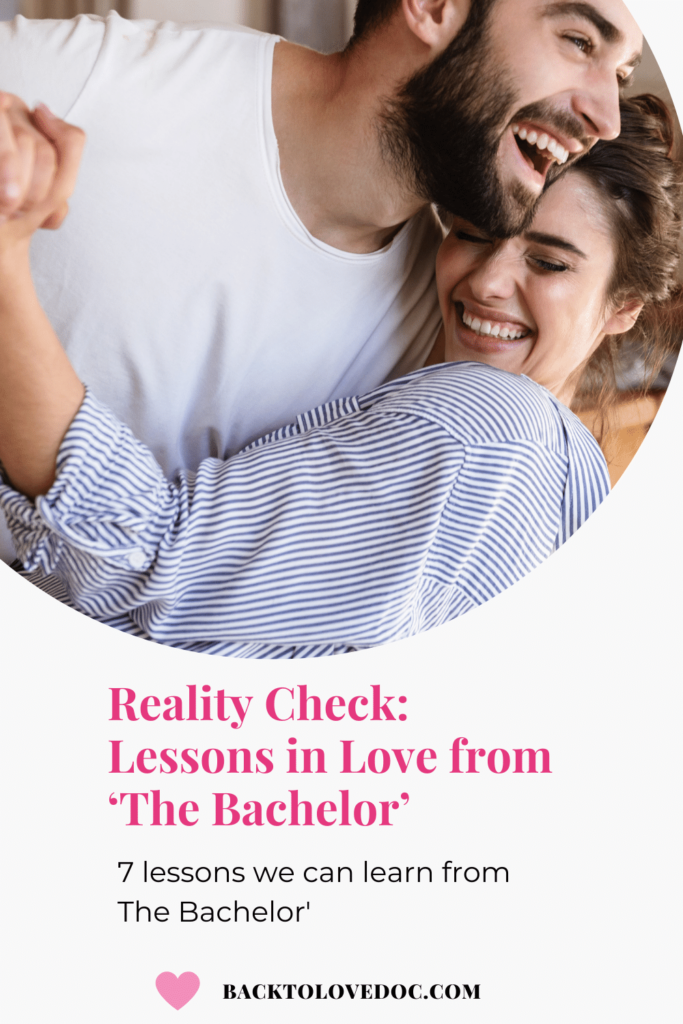As I always say, I watch the Bachelor for entertainment and fun. But, after each episode, it opens up conversations about what being in a relationship actually means. As a media psychologist, and a psychologist I can offer lessons we can learn about relationships from these contestants in real life.
You know that moment when a contestant on The Bachelor or The Bachelorette says something like “I can see myself falling in love with you” to the show’s lead? It’s usually around episode 4 or 5, and it’s always followed by that “I’m not here to make friends” soundbite they play over and over again in previews for the next week’s episode.
What they’re really saying is “I’ve just decided this person is my primary source of emotional fulfillment,” and if you’ve ever wondered why things start going downhill so fast after that point, we can offer a little insight: attachment theory.
But what happens when the bachelor says that to three different women? That’s what we saw play out on this 26th season of The Bachelor with Clayton Echard as he played for the hearts of Susie Evans, Gabby Windey and Rachel Recchia. We lived the up and down drama as these three women competed to be the woman he loved ‘most.’
While we sat at home with our popcorn, we watched as Susie, Gabby and Rachel each tried to convince Clayton that they were the one for him. As much as we wanted to believe them, there was just one problem: he’d already said those words to two other women!
So who’s telling the truth? And how could Clayton have let himself get in such a mess? More importantly, what can we learn from these characters as we live out our real relationships.
Attachment theory (I call them love styles)describes different ways people develop patterns of relating to others based on their early experiences of getting their needs met (or not). Those patterns come out in adult relationships, including ones played out for millions of viewers on reality TV. And those attachment styles always end up playing a vital role in the success or failure of these relationships.
It’s no surprise we see so many of the same relationship patterns play out on The Bachelor/ette. After all, it is a show about finding love.
So many of us are familiar with the ways in which insecurity, anxiety, and fear can wreak havoc on our relationships. Of course, some people are better at navigating those feelings than others, but at the end of the day, we all struggle with attachment issues.
There are four basic attachment styles:
Nervous Attachment: an attachment style in which a person experiences anxiety in their relationships with significant others in their lives. They tend to be insecure in relationships and feel as though they need to constantly prove their worthiness to their partner. They connect quickly, fall hard, wear their heart on their sleeve and people please.
Independent Attachment: Instead of craving intimacy, they’re so wary of closeness they try to avoid emotional connection with others. People with this style tend to push people away when they start to get close. They are often closed off and may have difficulty expressing their emotions or even admitting they have emotions at all. Being vulnerable is hard for them.
Confused Attachment: Combination of both anxious and avoidant attachment this person has both high anxiety and avoidance in relationships. They not only want closeness but also fear it — making it difficult for them to be vulnerable with someone else.
Secure Attachment: The secure attachment style is considered the healthiest and most functional for long-term relationships.
People with the secure attachment style tend to be empathetic and able to set appropriate boundaries with their romantic partners. They tend to feel safe, stable, and more satisfied in their close relationships. While they don’t fear being on their own, they usually thrive in close, meaningful relationships.
Before we dive into the attachment styles of previous Bachelorette and Bachelor contestants, let’s talk about what attachment styles are and why they’re important.
Attachment styles are simply ways in which we relate to others. As infants and small children, our experiences with caregivers shape what kind of attachment style we have. If we have caregivers who are inconsistent, unresponsive, or aggressive, that can lead to a “dismissive” attachment style; if our caregivers are neglectful or absent, that can lead to an “avoidant” attachment style; and if our caregivers were overly protective and controlling, that can lead to an “anxious” style.
Curious About Your Attachment Style?
Here's my media psychology on the three women and the bachelor they were competing for.
Susie:
Susie from “The Bachelorette” seems to be a Secure Sophia, and she’s ready to find her partner—the one who will put her first and treat her right. She might not be explicit about what she wants, but that doesn’t mean she doesn’t know exactly how to respond when someone gives her the wrong kind of attention.
After Clayton told two other women he was in love with them and had sex with them, Susie was well within her rights when she confronted him about it. To do otherwise would have meant ignoring her own boundaries and her values. You don’t get to do that if you’re a Secure Sophia, and you also don’t get to do it if you’re an adult.
Rachel:
In my opinion, Rachel appeared to have more of an anxious or nervous attachment style. In this show, we see her falling quick and hard for Clayton, which makes it obvious that she is sweet, loving and devoted.
But in a number of scenes we see her seeking validation from Clayton, ‘tell me I’m your person,’ a classic need for the anxious person to know they are special. Looking at Rachel’s family her Dad, Tony is a ballbuster, the mother says as much. It’s sweet that Tony is protective, but no one has been good enough. I’d wondered if this wasn’t a tough message for Rachel.
Gabby:
Gabby is one of the most iconic and funny women we’ve seen on TV in a long time. Her humor and psychological insights make her a fan-favorite. She was able to walk the fine line of poking fun at herself but also calling Clayton out for his lack of experience. Gabby was the voice of reason in all of this drama, but brought it home. Are you paying attention, Clayton, to how your actions affect us?
First looking at Gabby’s family and hearing about their estranged relationship, I wondered if something big had happened: was there some kind of abuse, mental health issues, alcohol or drug use? But clearly Gabby has done a lot of work, and as a result she’s close to her grandfather, father, and aunt. They all showed up for her during hometowns. Gabby is a woman who’s earned her attachment. She’s been through some tough times but has come out the other side more confident, radiant and sure of herself.
Clayton:
If you were thinking that Clayton looked a little too green to be on the Bachelor, you weren’t the only one. Clayton’s nervousness (classic nervous Nick attachment style) was actually a little adorable! He also seemed a bit “low expressive” (if you know what I mean).
This is probably why we saw Clayton eating up all the validation and attention… but also shutting down during conflict. Even though he was 28, he seemed kinda naive.
Clayton wasn’t introduced to the show by previous leads, he never made it to hometowns or fantasy suites, and apparently, he didn’t get any coaching on how to date other than from his parents.
His parents were really sweet—they tried very hard to bring Clayton up well—but they were disappointed in their son, who could blame them. His dad’s message was basically: “Women want to be first, not second.” I wondered if Clayton felt like he could get things right with his family even though they said they would support him no matter what.
As a couple, Susie and Clayton have a lot going for them. Susie is a secure type, which means she’s really trusting and can be counted on to stick with her partner through thick and thin. Clayton is more of an anxious type who needs some extra reassurance that his relationship is going well. These two types actually complement each other quite well: if Clayton can relax into his relationship with Susie, he’ll find that she’s the steady, supportive partner that he needs.
It sounds like Clayton is moving in with Susie, which is great news! If they can make it work together, this will be a big step toward building their future together. In order to make this work, though, it’s important that Clayton step up and meet Susie’s expectations for his behavior as a roommate.
The show is an excellent way to highlight attachment styles. You don’t know who someone is until you put them in hot water. And with shows moving so quickly and having elements of competition people are certainly in hot water. How people handle conflict and intimacy on reality television because those skills are important for romantic relationships.
I mean, isn’t that why we all watch? To figure out what works and what doesn’t in a relationship?
So here are some of the lessons we can learn from The Bachelor':
- Love can be blind but not to others, make sure to vet someone with the group, they know who’s a good person or not
- Watch out for love bombing, secure people don’t need to come on so strong, slow and steady wins the race
- If you can’t get vulnerable you will be seen as a risk. Think about it, if someone else says they love me and the other isn’t sure, who would you pick
- Don’t look at love as a competition because it’s not, it’s about who’s a better fit, not a better person
- First impressions really do matter, find a way to stand out but don’t look thirsty
- Always tell the truth about everything all the time. No exceptions. If you lie once, everything will collapse.
- The beginning of any relationship is important, set the tone for how you expect to be treated
More important than the lessons themselves is the understanding as to why they exist in the first place. It’s important that you understand yourself and your own romantic tendencies. Therefore, it’s important that you consider attachment styles when deciding how to approach relationships. If you know that your attachment style is ambivalent, or if it leans toward anxious, then there may be a problem with your current relationship if you already feel like you have to walk on eggshells.
Dating & Relationships are hard! Know that you’re not alone. If you feel that you need expert help I am here for you!
Take our Love Styles Quiz to find out more about what makes you tick. And when you are ready to have a qualified plan to help you succeed, try my online courses and break out of the cycle.


